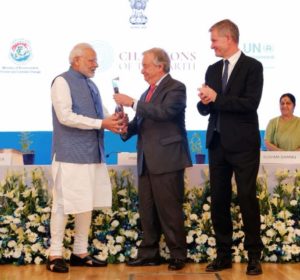India continues to be in the spotlight for its commitment to preserve the environon his ment and successfully implement sustainability programs, which have Clean Gas Fuelled Transportation in the frontline. On Monday October 1st, culminating the Swachhta Hi Seva period that celebrates  Gandhi’s vision of a Clean India on his 150th birth anniversary, Shri Dharmendra Pradhan, Union Minister of Petroleum and Natural Gas launched the SATAT (Sustainable Alternative Towards Affordable Transportation) initiative. The initiative invites Expression of Interest (EoI) from potential entrepreneurs to set up Compressed Bio-Gas (CBG) production plants and make available CBG in the market for use in automotive fuels. This significant move has the potential to boost availability of more affordable transport fuels, better use of agricultural residue, cattle dung and municipal solid waste, as well as to provide an additional revenue source to farmers.
Gandhi’s vision of a Clean India on his 150th birth anniversary, Shri Dharmendra Pradhan, Union Minister of Petroleum and Natural Gas launched the SATAT (Sustainable Alternative Towards Affordable Transportation) initiative. The initiative invites Expression of Interest (EoI) from potential entrepreneurs to set up Compressed Bio-Gas (CBG) production plants and make available CBG in the market for use in automotive fuels. This significant move has the potential to boost availability of more affordable transport fuels, better use of agricultural residue, cattle dung and municipal solid waste, as well as to provide an additional revenue source to farmers.
It is planned to roll out 5,000 Compressed Bio-Gas plants across India in a phased manner, with 250 plants by the year 2020, 1,000 plants by 2022 and 5,000 plants by 2025. These plants are expected to produce 15 million tonnes of CBG per annum, which is about 40% of current CNG consumption of 44 million tonnes per annum in the country. At an investment of approx. USD 23 billion, this initiative is expected to generate direct employment for 75,000 people and produce 50 million tonnes of bio-manure for crops.
India’s actions in defense of the environment have been recognized by the United Nations Environment Program (UNEP). Antonio Guterrez, Secretary-General of the United Nations presented today, October 3 2018, Indian Prime Minister Narendra Modi with the Champions of the Earth Award.
